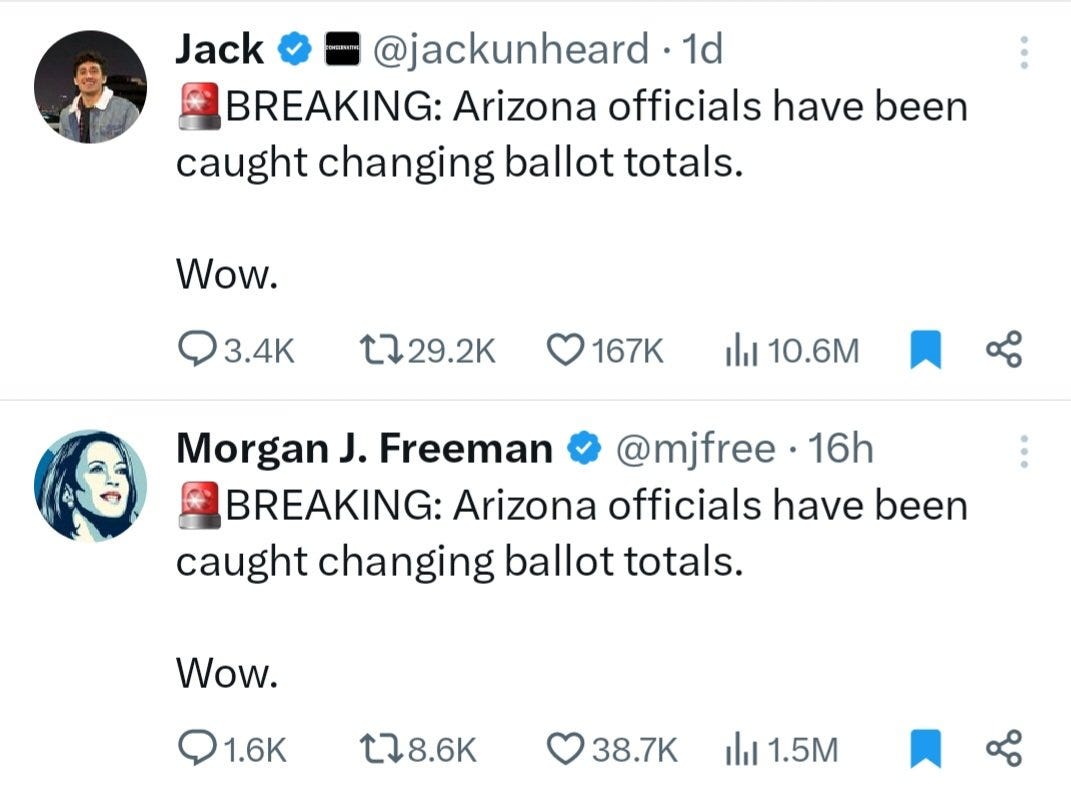🤥 Faked Up #26
X's Community Notes on Election Day were noisy and marginal, Instagram ads flog deceptive AI influencer get-rich schemes, and bots target Ghana's election
BlueSky is having a moment. If you are considering giving it a shot, this Chrome Extension greatly improved my experience by finding hundreds of accounts that I followed on Twitter.
Following the advice of paid subscriber Nick R., I’m experimentally adding a voice-over version of this newsletter. If enough paid subscribers comment/email approvingly, I’ll make it a regular feature.
This newsletter is a ~6 minute read and includes 58 links.
HEADLINES
GasBuddy is a full-time fact-checker now, I guess. The X-odus is probably down to both real defectors and bot accounts. ChatGPT hedged on U.S. election misinformation. TikTok astrologers did not predict the outcome of the U.S. election. A right-wing activist group is suing for access to records about the Biden deepfake robocall. Joe Rogan, RFK Jr. and assorted others re-posted a two-year old video laying out Donald Trump’s views on moderating and studying misinformation. Facebook is just AI slop commenting on AI slop.
TOP STORIES
ELECTION DAY’S NOISY NOTES
Thrilled to have researched and written this item with my friend Alex Mahadevan.
Just ahead of the election, X “re-architected” its Community Notes feature to make crowdsourced fact checks appear more rapidly on potentially misleading tweets. A lot was riding on the rare moderation instrument to survive Elon Musk’s takeover of the platform, especially given that election misinformation often comes from inside the house.
To get a sense of whether Community Notes delivered on their promise to “create a better-informed world,” we downloaded all of the 3,637 notes1 made on Nov. 5, Election Day in the United States.
We restricted our analysis to the tweets that had at least one note with more than 100 ratings as a proxy for popularity. We focused on tweets about the U.S. election (about two thirds of the total; floods in Spain were another recurring topic) and annotated them based on whether they addressed claims that could be fact-checked (as opposed to opinions or predictions).
We were left with 166 unique tweets and 849 notes. Of these, only 55 were actually fact-checkable. Only 24 of the notes in our sample were rated helpful, fewer than 5% of the total.
At the broadest level, it’s hard to call the program a success.
Only 29% of fact-checkable tweets in our sample carry a note rated helpful. And of the helpful notes, only 67% are assigned to a fact-checkable tweet. This is not the kind of precision and recall figures that typically get a product shipped at a big tech platform.
The three tweets with most notes were an Elon Musk claim about record turnout among men, one of many tweets purporting to show presidential candidate Kamala Harris pretending to speak with a voter on the phone, and a dog pic by vice presidential candidate JD Vance. The first two tweets are somewhat fact-checkable, and only the first one is vaguely fact check-worthy.
The most viewed Election Day tweets to get Community Notes were a sorrier bunch still. Obama’s prediction that the election result would not be known overnight was marginally Community Notes-worthy, but neither this tweet asking men who voted for Kamala for their pictures nor this Musk repost of a satirical video about “dropping illegal immigrants off at a rich liberal’s house” get anywhere close to deserving a fact check. Most of the related notes are best described as banal bickering.
The only glimmer of usefulness for Community Notes comes if you look at the three tweets whose notes received most “helpful” ratings. Incidentally, all three were pro-Trump posts. Two originated from the Musk-aligned @DogeDesigner, who claimed tech platforms Google Search and ChatGPT were biased against Trump, while the other one fabricated a claim by Maryland Democrat Jamie Raskin.
Looking at the sample as a whole, the tweets with most notes were about celebrity endorsements, which are easy to fact-check and relatively uncontroversial. These were followed by false claims about tech bias, a topic that is important but not as sensitive as reported issues at voting locations. Fully 41 notes were on spammy posts about Twitter changing its like button to a ballot box icon.
And then, there were plenty of checkable claims that didn’t receive any notes, including hundreds shared on X’s Election Integrity Community (see FU#25), some of which racked up millions of views.
Zooming out, the picture doesn’t look any brighter. In the three days leading up to the election, fewer than 6% of the roughly 15,000 notes reached helpful status.
We estimate that only about 13% of all notes during this crucial period were even about the election. Top rated public notes addressed instead whether French has a word for “toes,” Jason Kelce’s phone-smashing incident and former U.S. President Bill Clinton’s relationship with Monica Lewinsky.
If Community Notes had an impact on election information quality on X, it was marginal at best.
LEFT-WING DENIALISM?
There is a whiff of bothsidesism in the reports that election denialism has now taken over the American left. Setting aside that Kamala Harris accepted the results of the election while Donald Trump posted about voter fraud in Pennsylvania, it is certainly worth monitoring if there is a swing in partisan trust in election integrity akin to historic trends in economic sentiment (see chart below from Reuters).
For now, while certain left-wing election denialist posts did the numbers, these were often matched by right-wing posts suggesting the 2016 and 2024 results were evidence that 2020 was the year the vote was rigged.
This mirroring is sometimes comical and suggests engagement-driven grifting. The BBC’s Shayan Sardarizadeh found that rival Trump-supporting and Harris-supporting X accounts posted the same viral tweet about voter fraud in Arizona:
For my part, I am less interested in generic griping about the election that bleeds into rejecting the result. Instead, I’ll be monitoring if more elaborate conspiracy theories — like Elon Musk somehow using Starlink to change votes — end up gaining traction.
SLOP ALL THE WAY DOWN
A crypto influencer with an old photo of Jack Dorsey as their profile picture is running ads on Instagram for a “step-by-step guide to profiting from AI Instagram Models.” The account, which calls itself Gawid Financial, claims that “easy money [is] not just for hot women anymore.”
I am not a hot woman and I do like easy money, so I spent $22 on the ebook. You will be shocked to find out that the tome was not a business bible, with most of its content blandly generic and likely AI-generated. So much for a second side hustle.
“Build your AI influencer” is not Gawid Financial’s only work. Under the name Zack Arthur, he3 is currently selling eleven ebooks on Amazon, all about monetizing AI supermodels.
I found three other authors listing similar works, one of which actually did provide some more concrete advice. And of course, there’s always the $197 video course — actual value $2499!!! — by the creator of the popular AI model Emily Pellegrini. Professor EP, as he calls himself, is also running several ads on Instagram showing off his deception (“The internet couldn’t tell [Emily Pellegrini] wasn’t real”). You’ll be shocked to discover which demographic group he is targeting:
I know this sounds terribly silly, and it is! But it’s also another sign of the growing economy of AI thirst traps on Instagram (see FU#14) and the platform’s path towards becoming majority unreality.
KHELIF AGAIN
Algerian boxer Imane Khelif is taking legal action against French websites that published unverified excerpts from a clinical report that allegedly indicate that the athlete has male chromosomes. Citing patient confidentiality, which extends to confirming “whether a person has consulted a doctor or not,” the Paris hospital where the report was allegedly conducted will not release a comment.
Jacques Young, one of the purported co-authors of the report, told Deutsche Welle that his name was being used to spread disinformation.
HOW MANY AI BOTS DOES X HAVE?
Holz, Quiring, et al. tried to quantify the reach of AI accounts on Twitter by selecting a random 1 percent of all public posts in one week in March 2023 and seeing how many associated accounts used deepfaked profile pictures. Their estimate is 7,723 accounts, or 0.05% of the total.
While “fake-image accounts” did not post more than real-image accounts, they were on average far newer and were primarily focused on large-scale spamming attacks. In that limited time frame of study, most content published was in English, Turkish and Arabic and the principal topics were politics and finance.
GHANA’S ELECTION TARGETED BY BOTS
Speaking of AI-generated bots on X… Rest of World reports that “as Ghana approaches its presidential election on December 7, researchers have uncovered a network of 171 bot accounts on X that use ChatGPT to write posts favorable to the incumbent political party, the New Patriotic Party (NPP).”
A typical tweet by an account allegedly associated to the campaign reads “Dr. Bawumia’s emphasis on technology is powering Ghana’s rise as a competitive force in the international arena. #Bawumia2024 #Bawumia.” Riveting stuff!
ALBO’S TRAVAILS
Australia’s law to combat online misinformation (see FU#18) is running into concerted opposition. On one hand, the Human Rights Law Centre denounced the self-regulatory aspect of the law. By putting the onus on platforms to collectively define and deal with harmful information, the HRLC says “the law risks being toothless, and worse ineffective.” On the opposite end, are independent senators essential to the bill’s passage and some constitutional experts who worry about the law going too far with an overbroad definition of misinformation.
NOTED
How QAnon changed American politics forever (Panic World)
AI didn’t sway the election, but it deepened the partisan divide (WaPo)
AI-generated images threaten science — here’s how researchers hope to spot them (Nature)
Why Bother with AI Transparency? (Generative AI in the Newsroom)
Deepfakes, AI and the Battle for Democracy (Zeteo)
Supernotes: Driving Consensus in Crowd-Sourced Fact-Checking (arXiv)
This is the incredible investigative reporting channels that paid subscribers unlock XD
I’m just going to go out on a limb and assume it’s a he



















The feedback is in: I love the podcast format!
Notable observations: I do a lot less fact checking of your claims (e.g. am not clicking through on links), but I'm more engaged and less likely to get distracted mid flow (which unfortunately given my scattered attention these days is liable to happen). In any case, having multiple format options is great 👍🏼